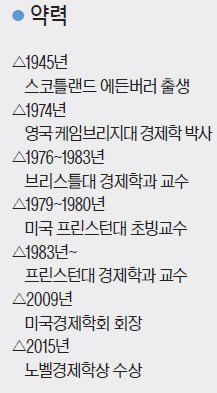"1750년대 시작된 산업혁명처럼
발전에 따른 불평등은 이롭고 공정
진보는 일반적으로 이런 과정 거쳐
공정한 과정 거쳐도 결과 불평등할 수도
세계화·기술혁신 거부하기보다
근로자 경쟁력 높이는 정책 펼쳐야"
[ 추가영 기자 ] 어느 국가나 사회든 불평등이 존재하고, 그 원인을 진단하고 극복하려는 노력을 기울이고 있다. 2015년 노벨경제학상을 받은 앵거스 디턴 미국 프린스턴대 교수는 한국경제신문에 보낸 특별기고문을 통해 불평등은 경제·정치·사회적 과정의 원인이 아니라 결과라고 주장했다. 불평등 문제를 포퓰리즘(대중인기영합주의)에만 동원하지 말고 다각적으로 접근해야 한다고 주문했다. 집단이기주의, 특혜와 같은 지대 추구(rent seeking)를 막고 경쟁을 장려해 생산성을 높이면 불평등을 줄일 수 있다고 강조했다.
 2016년과 2017년 두 해에 걸쳐 포퓰리스트들은 일제히 불평등을 원흉으로 지적했다. 불평등은 무엇인가. 불평등은 성장을 억제하는 데 혹은 촉진하는 데 어떤 역할을 하는가. 민주주의를 약화시키는가. 불평등은 사람들을 자살 혹은 절망으로 가득 찬 죽음으로 내몰고 있나. 불평등이 필요악이라면 우리는 어느 수준까지 감내해야 하는가.
2016년과 2017년 두 해에 걸쳐 포퓰리스트들은 일제히 불평등을 원흉으로 지적했다. 불평등은 무엇인가. 불평등은 성장을 억제하는 데 혹은 촉진하는 데 어떤 역할을 하는가. 민주주의를 약화시키는가. 불평등은 사람들을 자살 혹은 절망으로 가득 찬 죽음으로 내몰고 있나. 불평등이 필요악이라면 우리는 어느 수준까지 감내해야 하는가.내가 자주 받는 질문이다. 솔직히 말하면 어떤 질문도 딱히 도움이 되거나 답할 만한 성격의 좋은 질문이 아니다.
불평등은 경제·정치·사회적 과정의 원인이 아니라 결과다. 어떤 과정은 선하고, 어떤 과정은 악하고, 어떤 과정은 매우 나쁘다. 선악 그리고 최악을 구분해 내는 것만이 우리가 불평등을 이해할 수 있는 유일한 접근 방법이다.
불평등은 불공정과 같은 것이 아니다. 오늘날 선진국에서 불공정은 너무 많은 정치적 혼란 속에서 인용된다. 불평등이 야기되는 과정의 일부는 공정한 것으로 보인다. 그러나 일부는 매우 명백하게 불공정하다. 이것이 분노와 적개심의 원천을 제공한다.
공정한 과정을 거쳤지만 결과가 불평등하게 나타나는 예로 혁신가가 부를 축적하는 과정을 들 수 있다. 혁신가가 인류 전체에 도움을 주는 제품이나 서비스를 도입해 부유해졌다는 것을 부정하긴 어렵다.
 오늘날까지 가장 큰 격차로 남아 있는 불평등의 일부는 1750년대 시작된 산업과 보건혁명의 결과로 야기됐다. 이 과정에서 이득을 본 것은 유럽 북서부의 몇몇 국가뿐이었다. 하지만 수십억 명에 달하는 세계 인구의 생활수준과 건강이 개선됐다. 이 같은 발전(선진화)에 따른 국내외적인 불평등은 이롭고 공정하며, 일반적으로 진보는 이런 과정을 거쳐 이뤄진다.
오늘날까지 가장 큰 격차로 남아 있는 불평등의 일부는 1750년대 시작된 산업과 보건혁명의 결과로 야기됐다. 이 과정에서 이득을 본 것은 유럽 북서부의 몇몇 국가뿐이었다. 하지만 수십억 명에 달하는 세계 인구의 생활수준과 건강이 개선됐다. 이 같은 발전(선진화)에 따른 국내외적인 불평등은 이롭고 공정하며, 일반적으로 진보는 이런 과정을 거쳐 이뤄진다.국가의 특혜를 받아 부유해지는 것은 확실히 공정하지 못하기 때문에 분개해 마땅하다. 자본가나 시장에서 만든 결과물은 자동적으로 공정한 것으로 취급하고, 정부의 행위는 임의적이고 불공정한 것으로 보는 시각은 유럽에서보다 미국에서 더 많다.
이런 시각을 가진 자들은 정부 또는 대학의 후원을 받는 프로그램이 소수집단이나 이민자 등 특정 집단에 특혜를 주는 것에 반대한다. 이는 백인 노동자층 미국인들이 민주당에 등을 돌린 이유를 설명한다. 그들은 민주당이 소수집단, 이민자와 교육받은 엘리트를 위한 정당이라고 여기기 때문이다.
대중의 불만이 커지는 또 다른 이유는 중위소득이 지난 50년 동안 정체돼 있었기 때문이다. 중위와 상위소득 간 격차에 대해 두 가지 설명이 가능하다. 이 중 어느 것이 바른 설명인지 가려내는 것은 굉장히 중요한 문제다. 세계화, 기술혁신과 같은 집단적이고 지속적인 흐름이 상대적으로 낮은 수준의 기술을 가진 근로자의 가치를 폄하하고, 고등교육을 받은 근로자를 선호하면서 불평등을 야기했다는 것이 첫 번째 설명 논리다.
두 번째 논리는 좀 더 불평등을 죄악시한다. 중위소득이 늘어나지 않은 것은 상위계층의 임금과 부가 늘어난 직접적인 결과라고 설명한다. 이 같은 논리에 따르면 부자들이 더 부유해지는 것은 나머지 사람들의 희생이 따르는 것이다.
최근 연구결과는 적어도 미국에선 두 번째 설명에 일부 진실이 있다고 주장한다. 세계화와 기술의 변화는 전통적인 근로환경을 파괴했지만 잠재적으로 모든 사람에게 혜택을 가져올 수 있다는 것도 사실이다. 어떤 정책이 중산층과 노동자계층의 임금이 올라가지 않도록 막고 있는지 밝혀내기 위해선 더 많은 것이 고려돼야 한다. 몇 가지 관련 목록을 정리해봤다.
첫째, 건강보험 재정은 임금에 재앙 수준의 영향을 미친다. 노동자 임금이 의료산업의 이익과 높은 임금에 기여하는 셈이다. 매년 미국은 건강보험에 가구당 약 8000달러, 총 1조달러를 쏟아붓는다.
경제의 많은 부문에서 일어나는 시장 통합도 문제다. 예를 들어 병원 간 합병이 일어나면서 병원비는 빠르게 늘었지만 병원 근로자의 임금은 높아지지 않았다. 수년째 간호사 부족 현상을 겪고 있는데도 말이다. 시장이 집중되는 현상은 생산성 증대가 부진하다는 것을 의미한다. 혁신과 투자보다 지대 추구와 독점을 통해 수익을 거둬들이는 것이 더 쉽기 마련이다.
또 다른 문제는 미국 연방정부 기준 최저임금(시간당 7.25달러)이 2009년 7월 이후 인상되지 않았다는 것이다. 폭넓은 대중의 지지에도 불구하고 최저임금을 올리는 것은 언제나 어렵다.
아웃소싱(외주화)도 문제다. 외국뿐 아니라 미국에서도 아웃소싱은 정규직을 대체한다. 식당 웨이터, 경비원, 정비원 등은 파견직이 대부분이다. 인력파견 회사들은 주로 경쟁이 치열하고 임금이 낮은 산업에서 운영된다. 파견직은 수당과 승진 기회도 적다.
근로소득세액공제(EITC)는 미국에서 많은 저임금 근로자의 생활수준을 높였다. 하지만 이는 기본소득 보조금과 같은 무조건적인 복지와 달리 임금을 인하하도록 압박한다.
미숙련 이민자들도 임금 문제를 일으킨다. 이민자들은 미국인이 원하지 않는 일에 종사하는 경우가 많다고 한다. 하지만 미숙련 이민자의 유입이 없더라도 미숙련 미국인의 임금이 여전히 지금처럼 낮은 채로 유지될 것이라고는 믿기 어렵다.
대니 로드릭 프린스턴고등연구소 교수가 20년 전 지적했듯이 세계화는 노동시장을 더 탄력적으로 만들었다. 세계화가 임금을 낮추지는 않았더라도 적어도 근로자들이 임금 인상을 요구하기 어렵게 했다는 것이다.
또 다른 구조적인 문제는 증권시장이다. 증권시장을 통해 혁신에 대한 보상이 이뤄질 뿐 아니라 노동에서 자본으로 재분배가 이뤄진다. 중위소득이 정체되는 동안 국내총생산(GDP) 대비 자본소득 분배율이 20%에서 25%로 높아진 것으로 나타났다.
정치적인 문제도 있다. 우리는 각종 규제를 철폐하는 기간에 진입하고 있다. 또다시 금융위기가 오는 것을 막기 위해 도입한 도드-프랭크법(투자은행 규제법)이 폐지될 위협을 받고 있다. 은행의 머니 매니저들이 고객의 최대 이득을 올릴 수 있도록 한 규정을 제거하겠다는 뜻을 도널드 트럼프 대통령이 시사했기 때문이다.
만약 중위소득이 정체된 동안 상위소득이 늘어난 것이 맞다면 오히려 이것은 불평등 시대에 한 줄기 희망이 비친 것이라고 봐야 할 것이다. 왜냐하면 미국의 노동시장이 제 기능을 하지 못하는 이유가 복구가 불가능한 결과나 멈출 수 없는 과정인 세계화나 기술 변화에 따른 것이 아니기 때문이다.
소비자와 근로자에게 혜택을 주려고 고안된 정책들로 많은 진보가 이뤄졌다. 이 같은 정책은 많은 노동자도 반대하는 재분배 과세를 포함할 필요는 없다. 대신 경쟁을 장려하고 지대 추구를 억제하는 것에 정책 초점을 맞춰야 한다.
올바른 정책이 뒷받침될 때 자본주의적 민주주의(capitalistic democracy)가 부자만을 위해서가 아니라 모두를 위해 제대로 작동할 것이다. 우리는 자본주의를 폐지하거나 생산수단을 선별적으로 국유화할 필요가 없다. 이보다 중산층과 노동자 계층의 경쟁력을 되돌려야 한다. ⓒ Project Syndicate
● 앵거스 디턴 교수는
앵거스 디턴 미국 프린스턴대 교수(72)는 스코틀랜드 에든버러 출신 경제학자다. 소비자 행동분석과 경제 개발, 빈곤 연구에 주력하고 있다. 소비와 빈곤·복지 관련 연구로 2015년 노벨경제학상을 받았다.
1980년 존 무엘바워 당시 영국 옥스퍼드대 교수와 함께 ‘준(準)이상수요체계(AIDS)’로 알려진 모델을 고안하면서 주목받았다. 준이상수요체계는 이후 소비자 행동을 연구하는 경제학자들이 가장 널리 사용하는 수요 분석 도구로 자리 잡았다.
소비자 행동 분석 외에 세계 빈곤의 측정, 보건경제학 및 경제발전 등도 폭넓게 연구하고 있다. 《경제와 소비행동》 《소비의 이해》 《가계조사 분석: 정책 개발에 대한 미시경제학적 접근》 《인도 빈곤 논쟁》 등의 저서가 있다. 한국경제신문은 2015년 《위대한 탈출》을 출간했다.
[기고문 전문]
How Inequality Works
By Angus Deaton
PRINCETON – Inequality has been named as a culprit in the populist incursions of 2016 and 2017. But what is inequality, and what role does it play in inhibiting or encouraging growth, or in undermining democracy? Does inequality kill, say, by driving people to suicide or to “deaths of despair”? Or is inequality a necessary evil that we must tolerate at certain levels?
These are questions I am often asked. But, truth be told, none of them is particularly helpful, answerable, or even well posed. Inequality is not so much a cause of economic, political, and social processes as a consequence. Some of these processes are good, some are bad, and some are very bad indeed. Only by sorting the good from the bad (and the very bad) can we understand inequality and what to do about it.
Moreover, inequality is not the same thing as unfairness; and, to my mind, it is the latter that has incited so much political turmoil in the rich world today. Some of the processes that generate inequality are widely seen as fair. But others are deeply and obviously unfair, and have become a legitimate source of anger and disaffection.
In the case of the former, it is hard to object to innovators getting rich by introducing products or services that benefit all mankind. Some of the greatest inequalities today are a consequence of industrial and health revolutions that began around 1750. Originally, these processes benefited just a few countries in northwest Europe. But they have since improved living conditions and health outcomes for billions of people around the world. The inequalities stemming from these advances – both within and between countries – are beneficial and fair, and a key feature of progress generally.
On the other hand, getting rich by bribing the state for special favors is clearly unfair, and rightly resented. Many in the United States – more so than in Europe – automatically regard capitalist or market outcomes as fair, and government action as arbitrary and unfair. They object to government or university-sponsored programs that seem to favor particular groups, such as minorities or immigrants.
This helps to explain why many white working-class Americans have turned against the Democratic Party, which they view as the party of minorities, immigrants, and educated elites. But another reason for growing public discontent is that median real (inflation-adjusted) wages in the US have stagnated over the past 50 years.
There are two different explanations for the divergence between median and top incomes, and it matters a great deal which one is correct. The first attributes it to impersonal and unstoppable processes such as globalization and technological innovation, which have devalued low-skill labor and favored the well educated.
The second explanation is more sinister. It holds that median-income stagnation is actually the direct result of rising incomes and wealth at the top. In this account, the rich are getting richer at the expense of everyone else.
Recent research suggests that there is some truth to the second story, at least in the US. Although globalization and technological change have disrupted traditional work arrangements, both processes have the potential to benefit everyone. The fact that they have not suggests that the wealthy have captured the benefits for themselves. It will take much more work to determine which policies and processes are holding down middle- and working-class wages, and by how much, but what follows is a preliminary list.
First, health-care financing is having a disastrous effect on wages. Because most Americans’ health insurance is provided by their employers, workers’ wages are essentially paying for profits and high salaries in the medical industry. Every year, the US wastes a trillion dollars – about $8,000 per family – more than other rich countries on excessive health-care costs, and has worse health outcomes than nearly all of them. Any one of several European financing alternatives could recoup those funds, but adopting any of them would trigger the fierce resistance of those now profiting from the status quo.
A related problem is increasing market consolidation in many sectors of the economy. As a result of hospital mergers, for example, hospital prices have risen rapidly, but hospital wages have not, despite a decades-long shortage of nurses. Increasing market concentration is probably a factor underpinning slow productivity growth, too. After all, it is easier to reap profits through rent-seeking and monopolization than through innovation and investment.
Another problem is that the US federal minimum wage – currently at $7.25 per hour – has not increased since July 2009. Despite broad public support, raising the minimum wage is always difficult, owing to the disproportionate influence that wealthy firms and donors have in Congress.
Making matters worse, more than 20% of workers are now bound by non-compete clauses, which reduce workers’ bargaining power – and thus their wages. Similarly, 28 US states have now enacted so-called “right-to-work” laws, which forbid collective-bargaining arrangements that would require workers either to join unions or pay union dues. As a result, disputes between businesses and consumers or workers are increasingly settled out of court through arbitration – a process that is overwhelmingly favorable to businesses.
Yet another problem is outsourcing, not just abroad, but also within the US, where businesses are increasingly replacing salaried or full-time workers with independent contractors. The food servers, janitors, and maintenance workers who used to be a part of successful companies are now working for entities with names like AAA-Service Corporation. These companies operate in a highly competitive low-wage industry, and provide few or no benefits and little opportunity for advancement.
The earned income tax credit (EITC) has provided a boost in living standards for many low-paid US workers. But, because it is available only to those who work, it puts downward pressure on wages in a way that unconditional benefits, such as a basic-income grant, would not.
Unskilled immigration also poses a problem for wages, though this is controversial. It is often said that immigrants take jobs that Americans do not want. But such statements are meaningless without some reference to wages. It hard to believe that low-skilled Americans’ wages would have remained as low as they did in the absence of inflows of unskilled immigrants. As the economist Dani Rodrik pointed out 20 years ago, globalization makes demand for labor more elastic. So, even if globalization does not reduce wages directly, it makes it harder for workers to get a pay raise.
Another structural problem is that the stock market rewards not just innovation but also redistribution from labor to capital. This is reflected in the share of profits relative to GDP, which has grown from 20% to 25% over the same period that median wages have stagnated. The increase would be even higher if executive salaries were counted as profits rather than wages.
The final problem on our preliminary list is political. We have entered a period of regulatory bonfires. The Consumer Financial Protection Bureau, despite having uncovered major scandals, is now under threat, as is the 2010 Dodd-Frank legislation, which introduced measures to prevent another financial crisis. Moreover, President Donald Trump has indicated that he wants to eliminate a rule requiring money managers to act in their clients’ best interest. All of the deregulatory “reforms” currently being proposed will benefit capital at the expense of workers and consumers.
The same is true of US Supreme Court rulings in recent years. The court’s decision in Citizens United v. FEC, for example, gave wealthy Americans and even corporations the ability to spend almost unlimited amounts to support candidates and engineer legislative and regulatory outcomes that work in their favor.
If this account of stagnant median wages and rising top wages is correct, then there may be a silver lining to our era of inequality, because it means that the US’s dysfunctional labor market is not an irremediable consequence of unstoppable processes such as globalization and technological change.
Broadly shared progress can be achieved with policies that are designed specifically to benefit consumers and workers. And such policies need not even include redistributive taxation, which many workers oppose. Rather, they can focus on ways to encourage competition and discourage rent-seeking.
With the right policies, capitalist democracy can work better for everyone, not just for the wealthy. We do not need to abolish capitalism or selectively nationalize the means of production. But we do need to put the power of competition back in the service of the middle and working classes.
Angus Deaton, the 2015 Nobel laureate in economics, is Presidential Professor of Economics at the University of Southern California and Professor of Economics and International Affairs at Princeton University’s Woodrow Wilson School of Public and International Affairs.
Copyright: Project Syndicate, 2017.
www.project-syndicate.org
정리=추가영 기자 gychu@hankyung.com
기업의 환율관리 필수 아이템! 실시간 환율/금융서비스 한경Money
[ 무료 주식 카톡방 ] 국내 최초, 카톡방 신청자수 35만명 돌파 < 업계 최대 카톡방 > --> 카톡방 입장하기!!
관련뉴스














